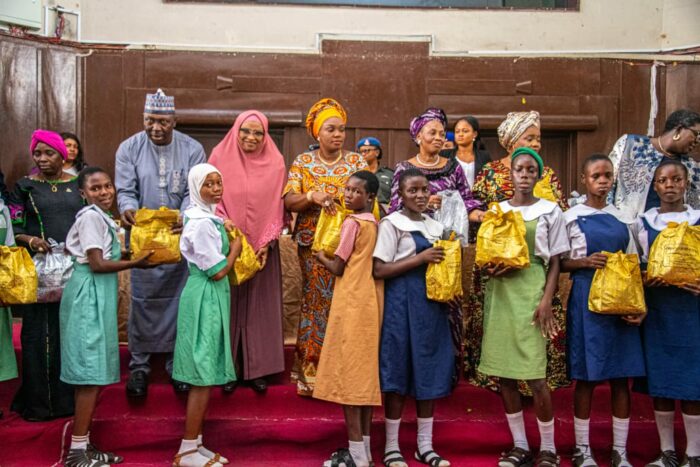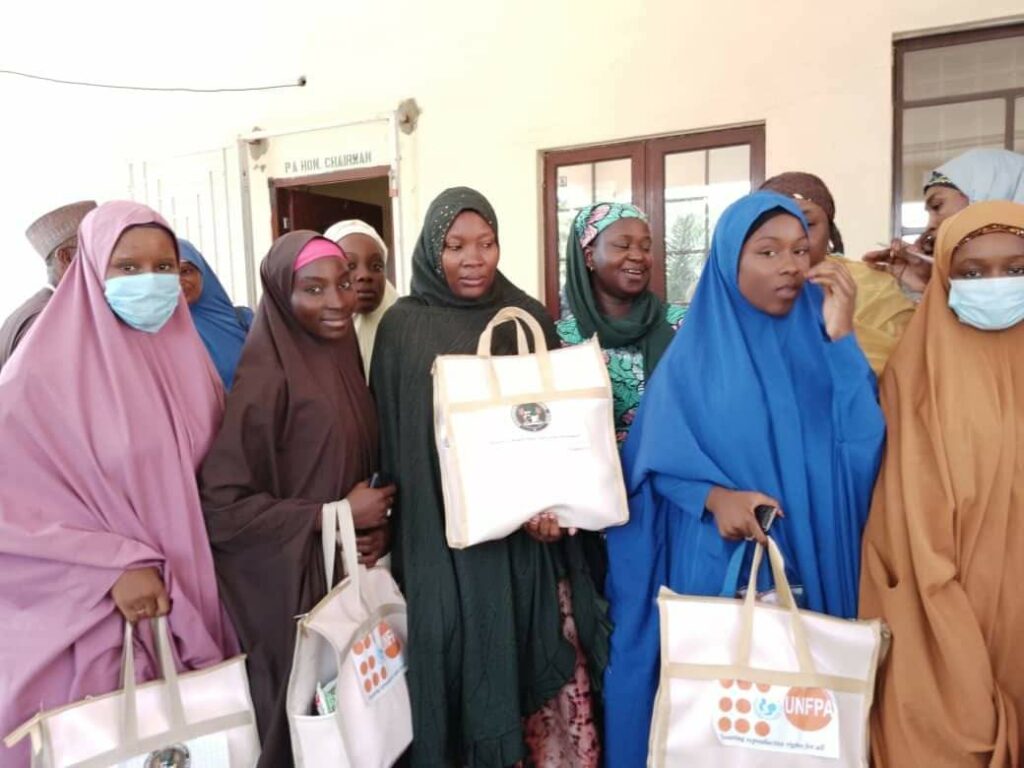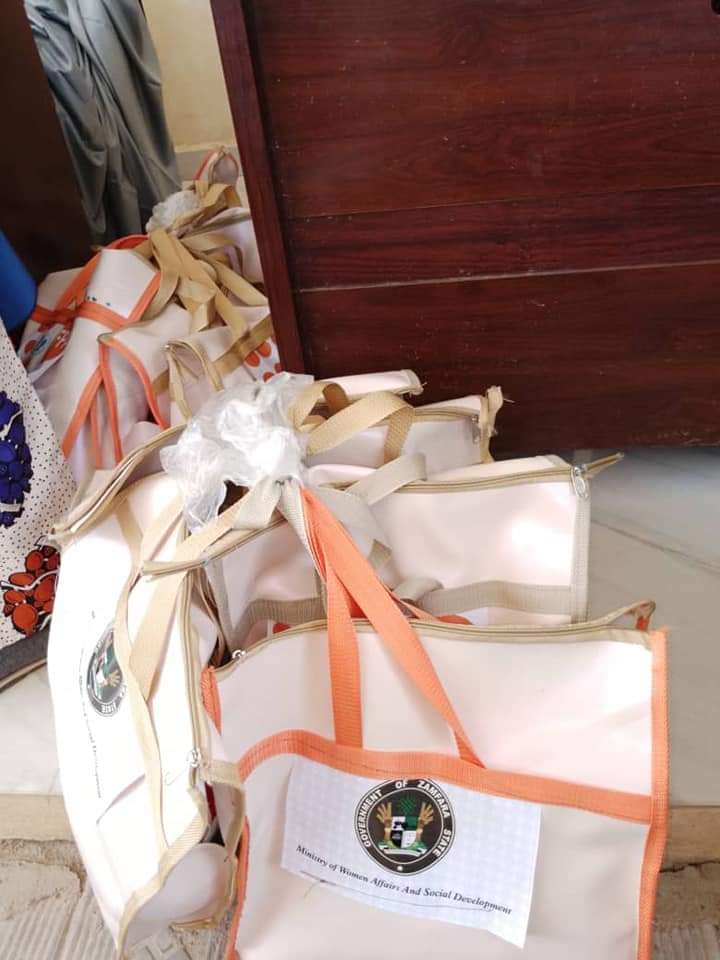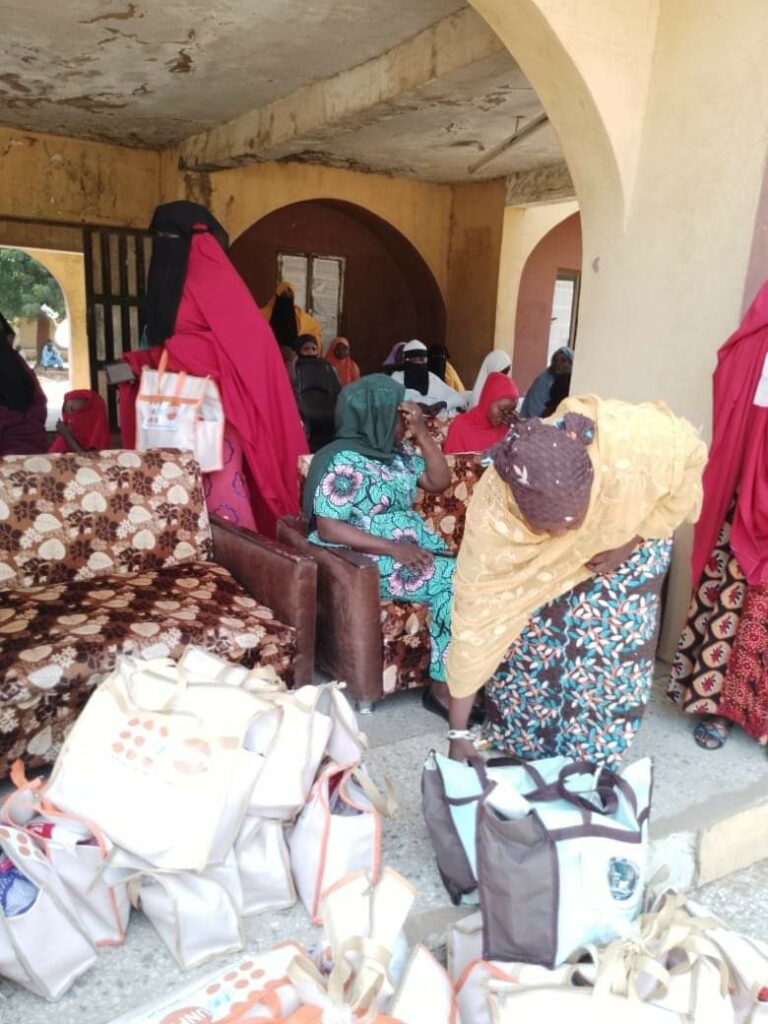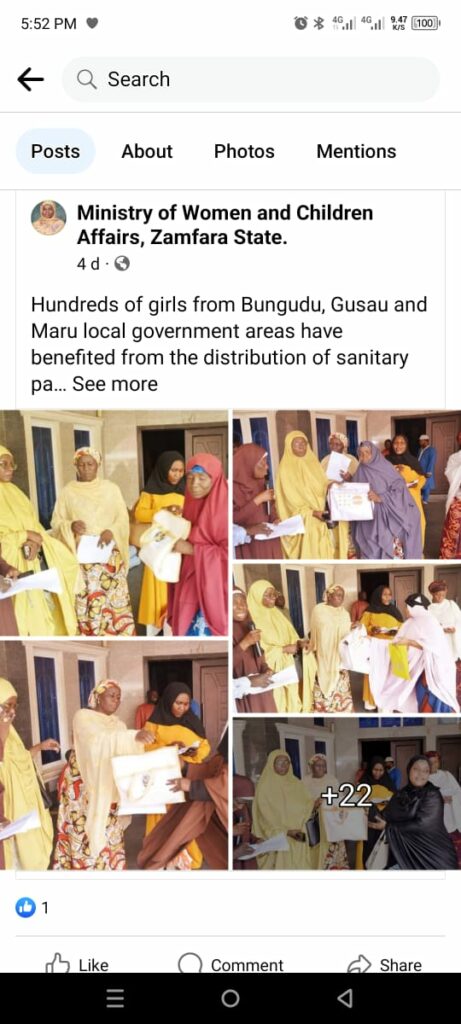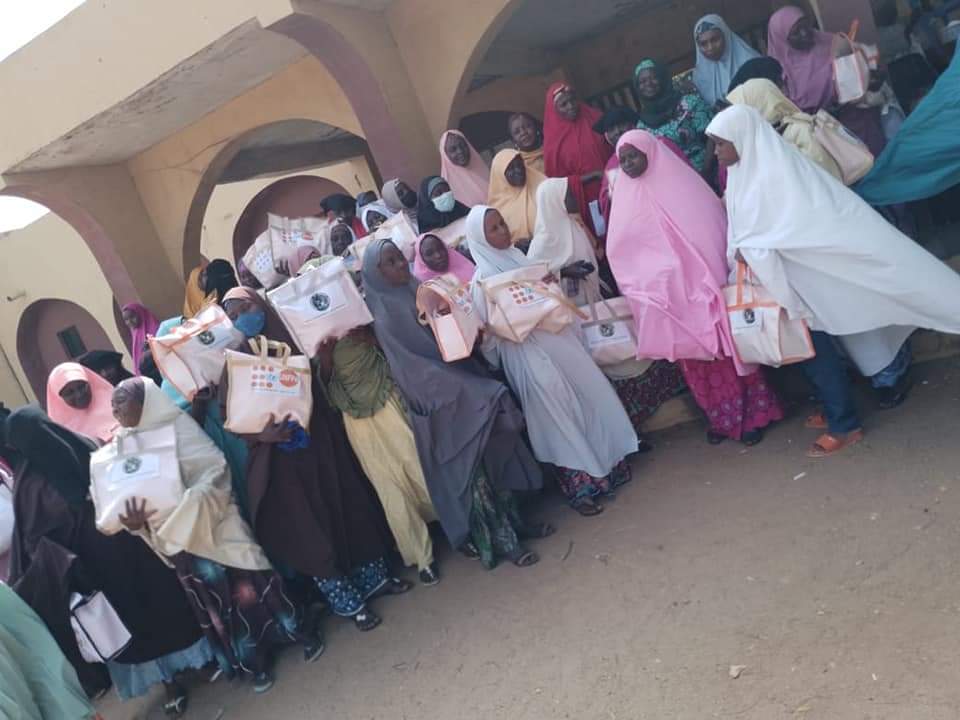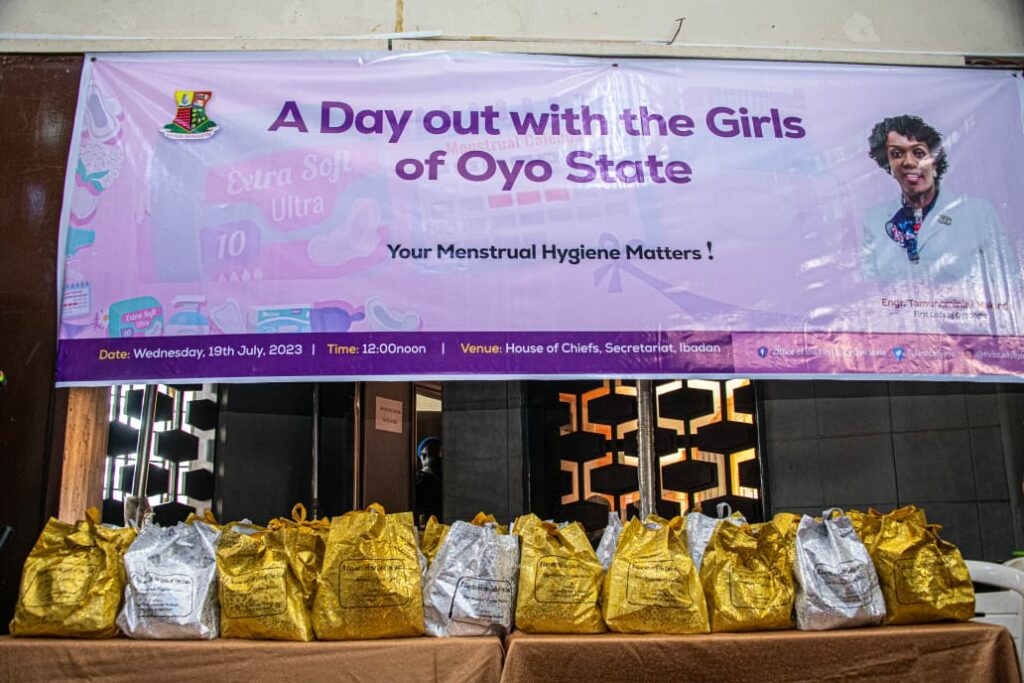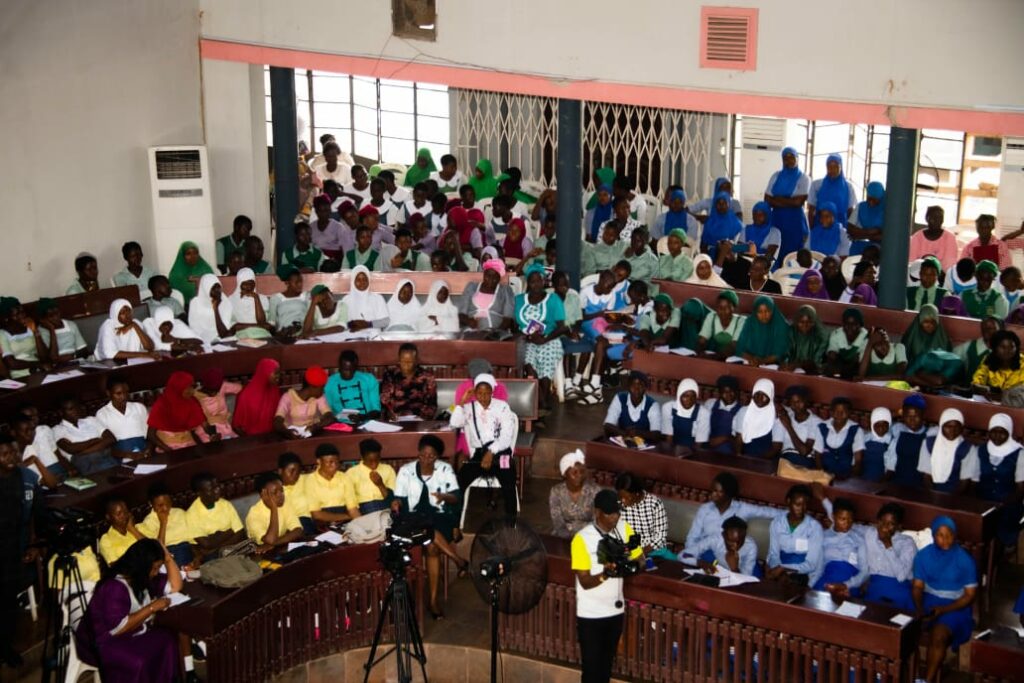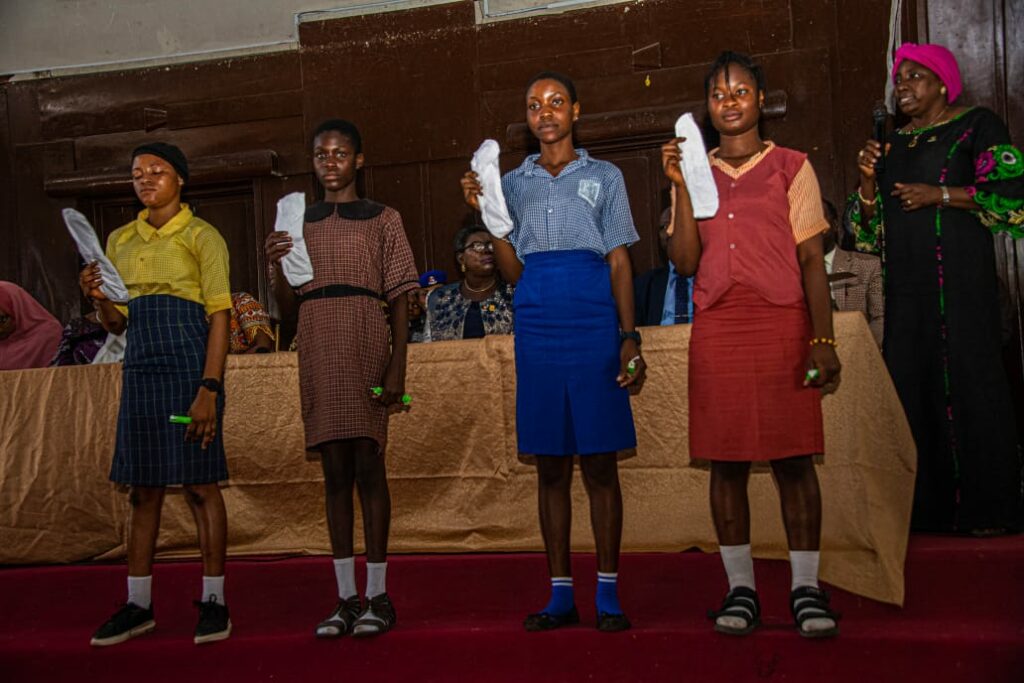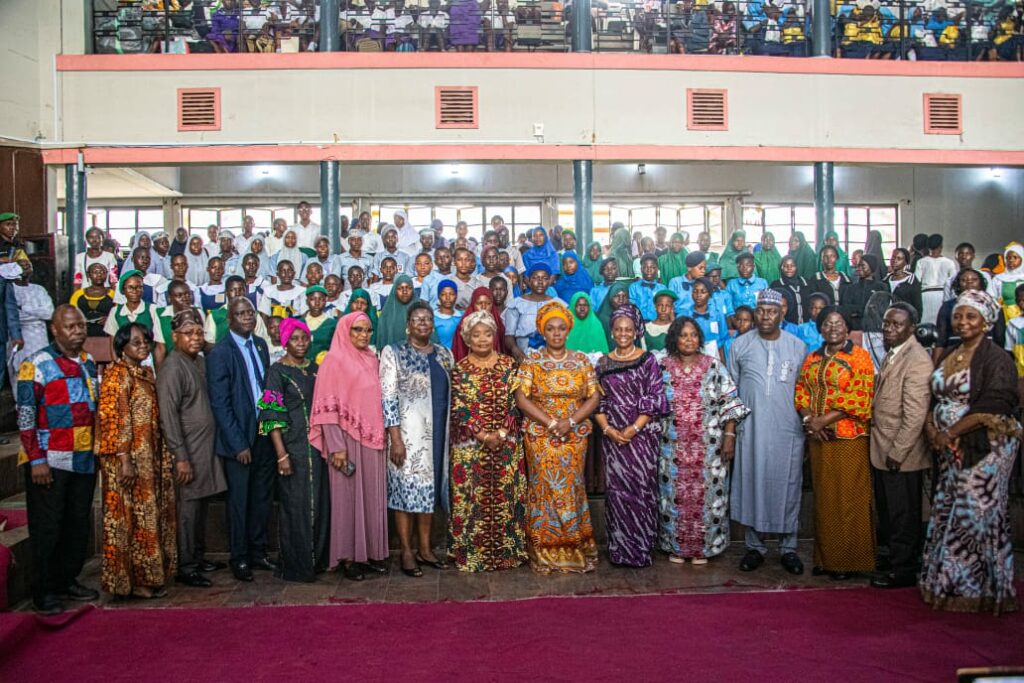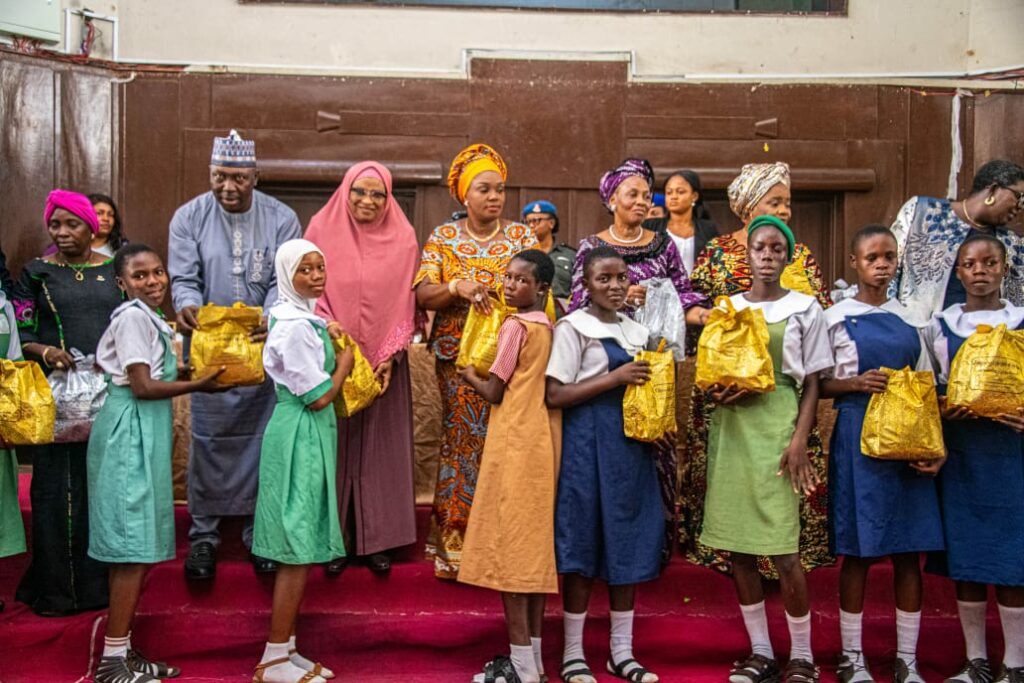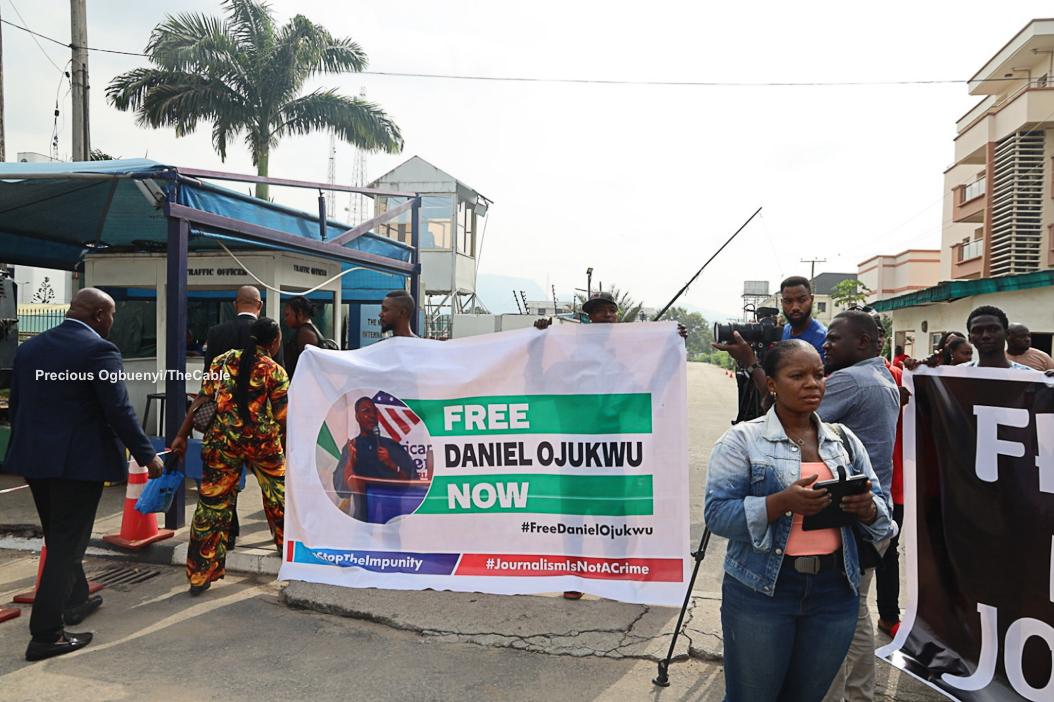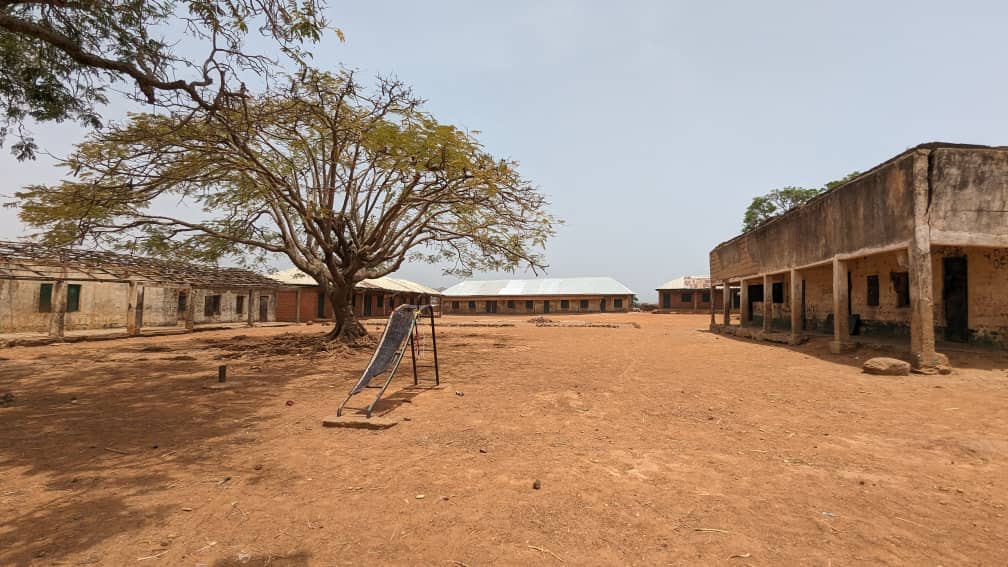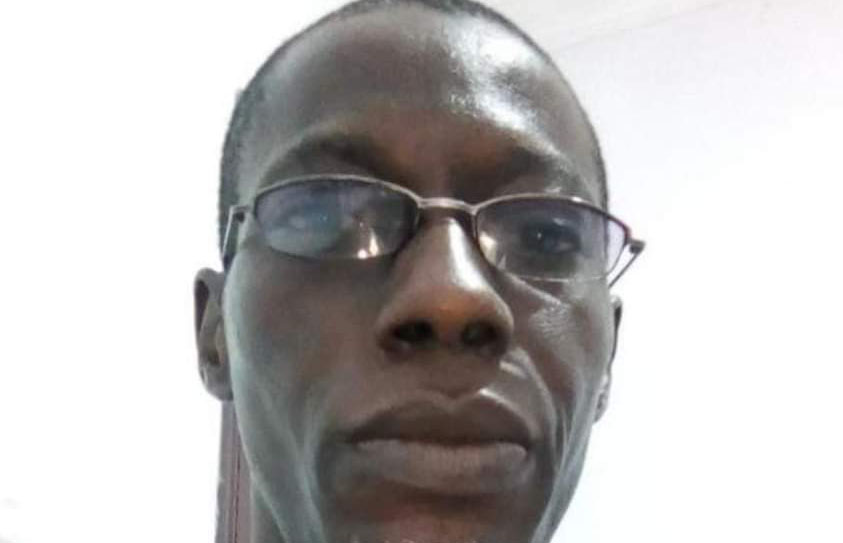On May 3, 2023, exactly 26 days before exiting office, the then Minister of Women Affairs, Dame Pauline Tallen, awarded unbudgeted contracts and made payments to the tune of N90 million to 11 companies.
FIJ has now found many infractions in the process that led to the award of contracts to engineering and renewable energy firms to procure and supply reusable sanitary pads for women and girls in selected states.
The contracts were also awarded in violation of the provisions of section 1.4, sub-section 1 of the procurement guidelines and rules. According to the procurement rules, “every project must have budgetary provision”.
However, findings by FIJ have revealed that the Ministry of Women Affairs awarded all contracts with no budgetary approval. The over N90 million provision for reusable sanitary pads for women was not listed in the 2022 and 2023 approved annual budgets of the ministry, a search revealed.
COMPANIES WITH NO EXPERTISE/EXPERIENCE
Powercell Limited, a renewable energy company owned by Balogun Omotayo, is one of the firms that benefited from the contracts.
Powercell was paid N8,696,880 to procure 3000 reusable sanitary pads for women and girls in Zamfara State.
The ‘About Us’ page on the company’s website states that it is a renewable energy provider specialising in delivering energy-efficient solutions to power homes and industries across Nigeria.
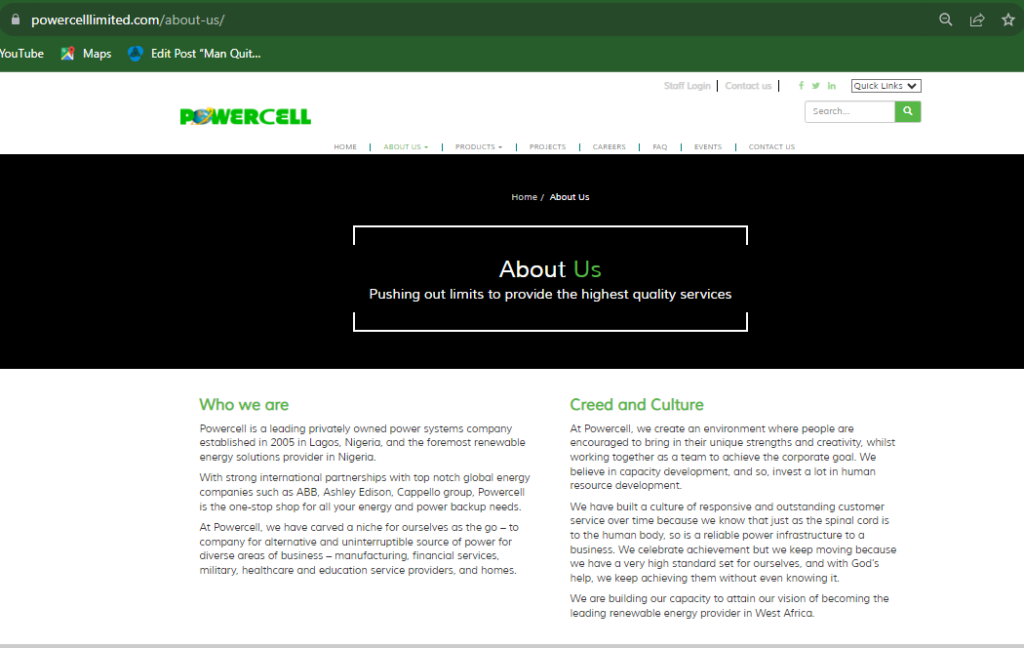
The company’s receptionist confirmed this when contacted by FIJ to inquire about the sanitary pad contract. “This is a solar company you’re calling. It can’t be our company; we don’t deal with such. We only deal with solar and UPS here,” the receptionist told FIJ.
Less than five minutes after the phone conversation with the receptionist, Kikelomo Oludipe, who introduced herself as the human resource manager of the company, called back to say she was not aware of any contract related to sanitary pads. She corroborated the response of the receptionist that Powercell is into renewable energy and power backup.
Before getting off the call, Ms Oludipe promised to relay the enquiry to the company director, Mr Balogun, and then get back to this reporter afterwards.
About an hour later, another worker at the company, who identified himself as Segun Odejaye, called back to say the contract was indeed awarded to the firm and that it had been supplied.
Odejaye was unable to state when the project was done and how the company got the contract considering their lack of expertise. But he referred this reporter to the programmes officer who called two hours later and identified himself as Ahmed Barde.
“The project was carried out last year in November/ December. We supplied the pads to the Ministry of Women Affairs. We did bidding with two other companies and we were selected because of our price,” Mr. Barde told FIJ.
Although the contractor said the project was carried out between November and December 2022, FIJ found that payment was made by the ministry on May 3, 2023, as contained in GovSpend, a platform maintained by BudgIT Nigeria to track and analyse federal government spending over time. The information is also on the Open Contracting Portal.
When asked how the company moved from renewable energy to sanitary pads, Mr Barde said, “No, we have consultants; the company name is just company name. We have consultants under the company and we liaised with the company producing sanitary pads.”
“We did the right thing because we did bidding and we gave a good price.”
On whether the company had handled such a project before, he said that was the first time.
“We did the right thing,” he said the second time. “We did whatever the ministry asked us to do.”
But Mr Barde’s claim runs contrary to section 16 of the Public Procurement Act 2007. The section stipulates that all bidders, in addition to requirements contained in any solicitation documents, shall “(a) possess the necessary: (i) professional and technical qualifications to carry out particular procurements; (ii) financial capability; (iii) equipment and other relevant infrastructure; (iv) shall have adequate personnel to perform the obligations of the procurement contracts; (b) possess the legal capacity to enter into the procurement contract”.
OTHER COMPANIES WITH NO EXPERTISE/EXPERIENCE
Apart from Powercell Limited, the Ministry of Women Affairs gave out the contract to other firms without the requisite experience and expertise concerning the project.
Sotru Engineering Ltd. was paid N8,713,800 to procure 3000 reusable sanitary pads for women and girls in Kwara State.
Though registered and active on the CAC portal, the company neither has an official website nor a social media presence to show its specialisation as an engineering company. However, FIJ found that it is an electrical engineering company listed on the directory of Corporate Electrical Contractors.
This is not the first time the Ministry of Women Affairs has contracted unrelated projects to Sotru Engineering Ltd.
On December 30, 2022, as much as N26,224,120.00 was paid to Sotru Engineering Limited for erosion control activities to preserve the structural integrity of the ministry’s office building.
In 2017, the Nigerian Rural Electrification Agency (REA), which is charged with the electrification of rural and unserved communities, shortlisted Sotru as one of the pre-qualified companies for the federal government’s 2017 capital projects. The company was also shortlisted by REA in 2019 for a similar project.
FIJ also found that two other companies, Dwet Consultants Ltd. and Powerboss Nig Ltd, which were paid N8,719,440 and N8,727,900, respectively for the same purpose in Jigawa and Plateau states, were listed on NG-Checks as engineering companies. While Dwet was found to be registered and active on the CAC portal, Powerboss has been inactive – both companies did not have a website or social media presence.
Another company paid to procure 3,000 sanitary pads for women and girls in Bornu State, Pioneer Investment & Capital Projects Ltd, was also found to be into electrical contracting.
It was named alongside six other companies in the list of prequalified companies for the cabling and wiring of already installed electric poles in Gamawa federal constituency, Bauchi State, for the 2019 rural electrification project.
Another company, Ayigab Integrated Services Ltd., was paid a similar amount to buy reusable sanitary pads for girls in Ekiti State. However, FIJ found that it is a general construction company specialised in building and civil engineering contracts.
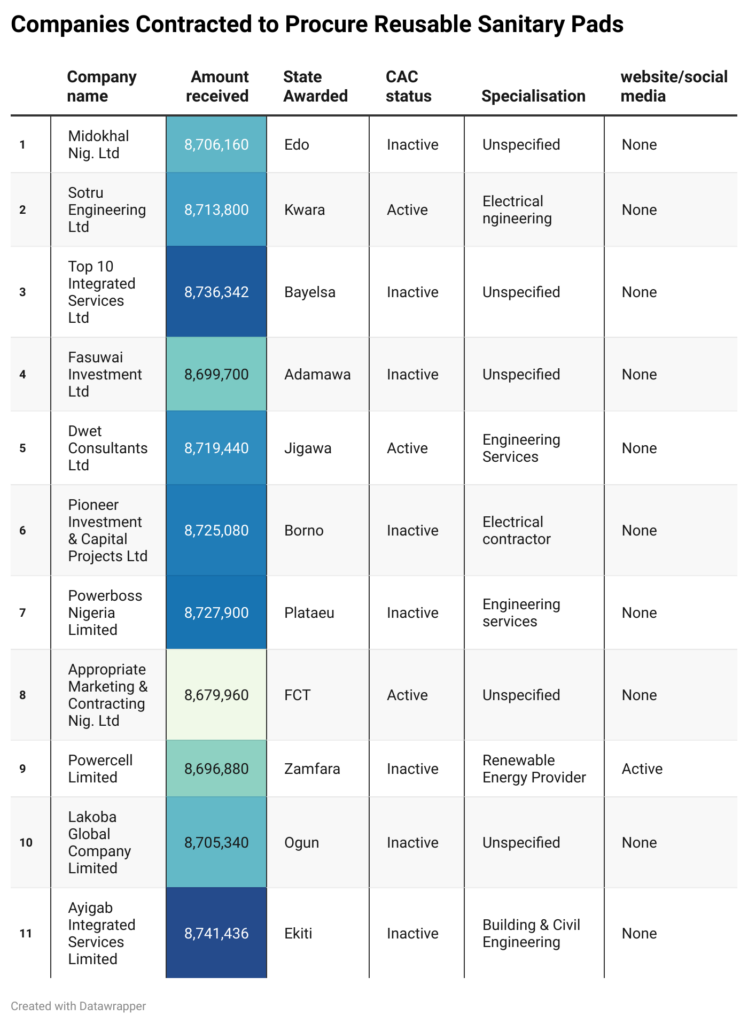
These are against section 15 of the Public Procurement Consultancy Services regulation which states that for a company to be eligible to bid for and execute contracts for the procurement of consulting services, every bidder must have the necessary professional and technical qualifications, managerial competence, bonafide reputation, financial viability, equipment and other physical facilities, including post-contract consultations or services (where appropriate), and qualified personnel to perform the contract
Azeez Mujib, a commercial lawyer, faulted the claim that any company can be awarded any contract regardless of its area of specialisation. According to Mujib, a company is limited by the nature of the businesses it intends to carry out.
“The nature of the business is usually contained in the company’s memorandum and articles of association. Where such a company carries on a business contrary to its memorandum, such business will be declared ultra vires. There is a limit to what a company can do,” he explained.
ONLY TWO STATES HAVE SUPPLIED SANITARY PADS
Five months after the contract award, only two states have distributed sanitary pads to the beneficiaries. The first was Oyo State, where the programme was flagged off on July 19, 2023, while the second was Zamfara State, exactly five days after the phone conversation with Mr Barde, the contractor from Powercell in charge of the state.
During the flag-off in Oyo, Mrs Monisola Udoh, the permanent secretary at the Ministry of Women Affairs, said the event marked the beginning of the proposed distribution of 39,000 reusable pads to women and girls in 13 States of the federation (Adamawa, Borno, Kwara, Plateau, Jigawa, Zamfara, Edo, Bayelsa, Imo, Enugu, Ogun, Ekiti and Oyo).
Although the event reportedly had schoolgirls from 100 schools across the 33 local government areas of Oyo State in attendance, FIJ obtained the list of schools that participated in the flag-off from the office of the Oyo State first lady and found that it contained only 95 schools from across the state.
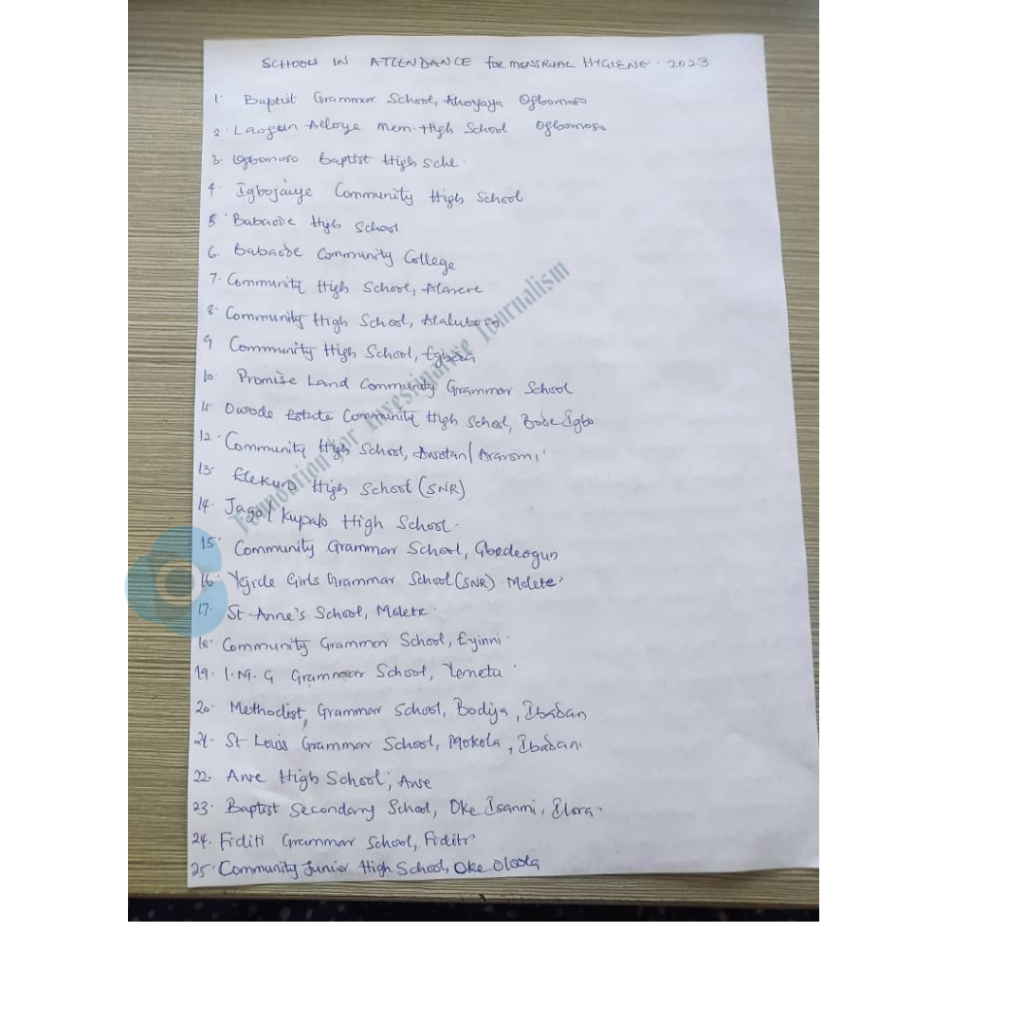
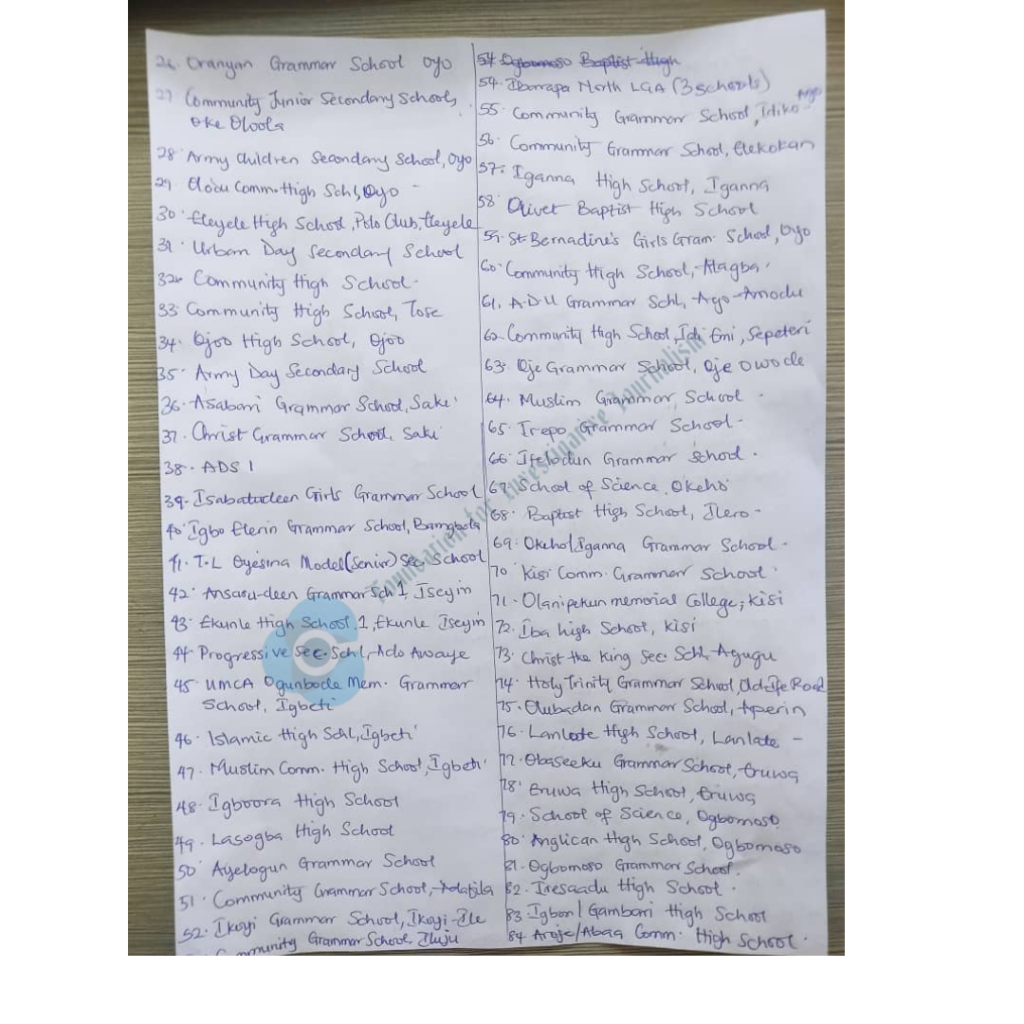
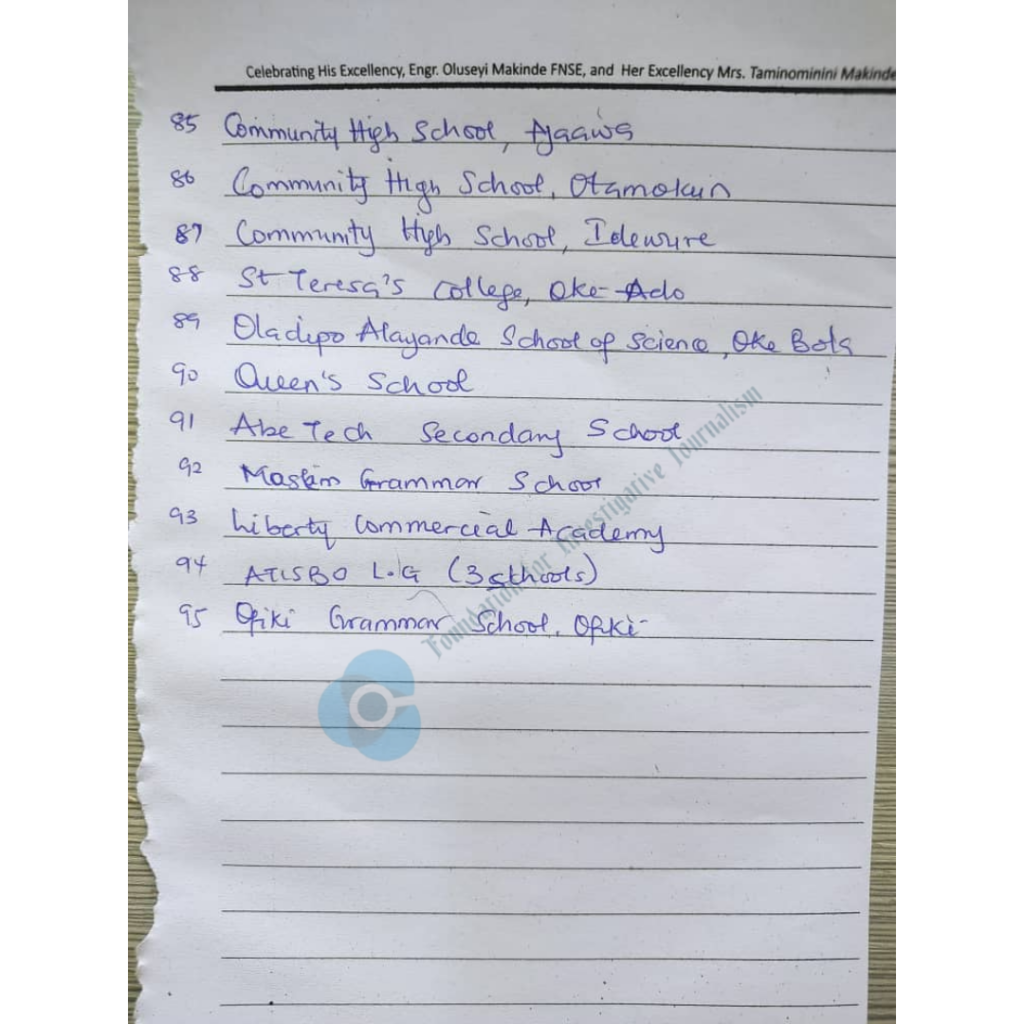
FIJ visited I.M.G, Yemetu, Ibadan, one of the schools listed among the beneficiaries of the 3000 reusable sanitary pads in Oyo State, and discovered that no student was selected to benefit from the distribution.
“They initially informed us to select and prepare 10 students ahead of the programme, but they later called and asked us not to come for the programme again,” the principal told FIJ after a long discussion and resistance towards speaking on the issue. “But I’m very sure that the programme was held.”
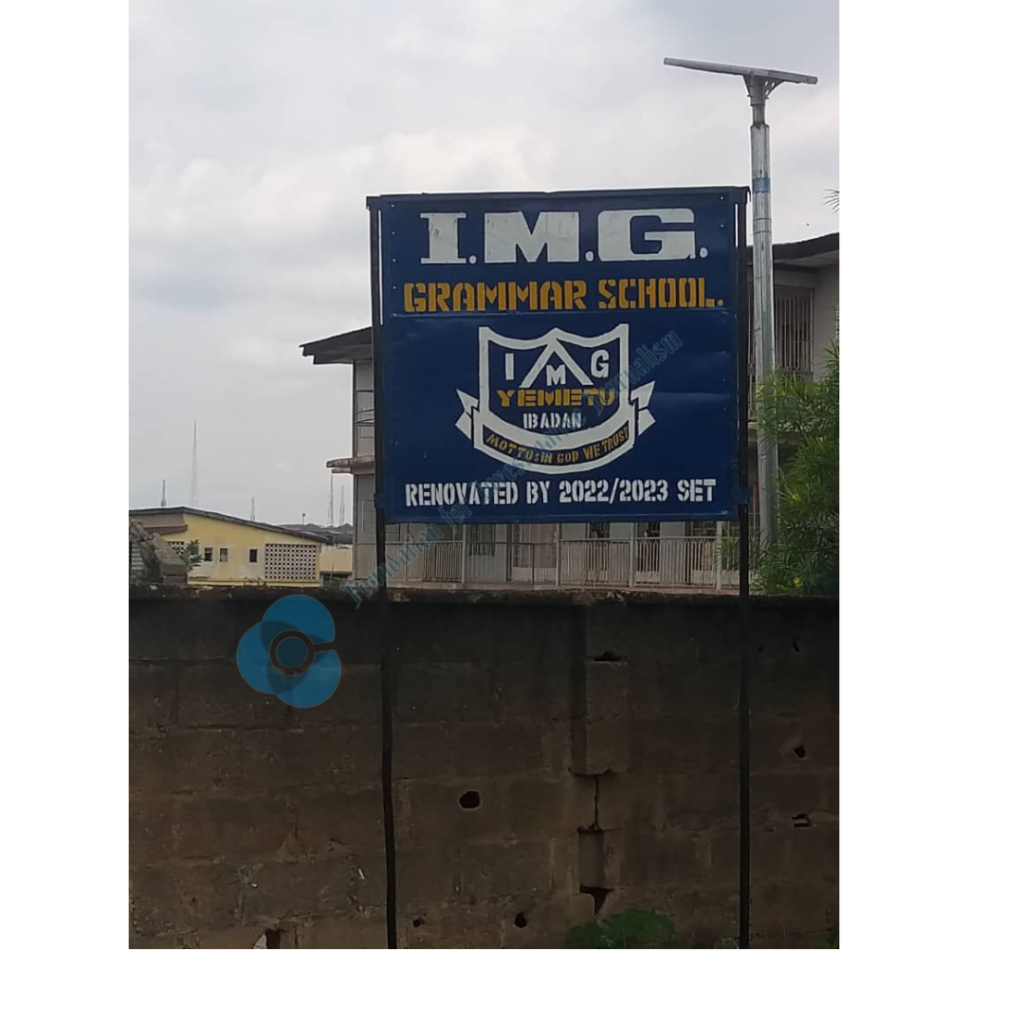
Similarly, the principals of Community Grammar School, Eyinni, Ibadan, told FIJ that no student was selected from the school. While the principal of the senior section of the school said he was not aware of the programme, the principal of the junior section told FIJ that she heard of the programme but no student was selected from the school.
FIJ also visited Baptist Secondary School, Oke Isanmi, Ilora, and gathered that 10 students from the school were selected to attend the event. Each of the selected students received two packs of reusable sanitary pads containing five pieces each, two bathing soaps, two Roll-on deodorants and N12,000 for their transportation.

At St Anne’s School Molete, Ibadan, FIJ gathered that nine female students attended the programme. “They were given reusable sanitary pads, transport fare and other items I cannot recall,” the vice principal told FIJ.
No other state had carried out the distribution at the time of filing this report. Also, a search of the GovSpend platform revealed that only 11 contractors representing 11 states received payment for the procurement.
No contractor was paid to procure sanitary pads for girls in Enugu and Imo, whereas, the two states were listed among beneficiaries. While a contractor was paid to procure pads for girls in the Federal Capital Territory (FCT), Mrs Udoh did not include the nation’s capital in the list of states to receive the pads.
INACTIVE COMPANIES, NO WEBSITES/SOCIAL MEDIA
FIJ’s findings revealed that eight out of the 11 companies awarded the sanitary pad contract are inactive on the CAC database. This means that such companies had not updated their data when FIJ checked, thereby failing to comply with sections 417 to 424 of the Companies and Allied Matters Act (CAMA) Act, 2020.
Section 417 of the CAMA Act 2020 states that every company must make and deliver its annual returns to the CAC every year to be eligible for contracts.
According to the rules and regulations of the Corporate Affairs Commission, inactive companies are legal entities that have failed to comply with sections 417 – 424 of the Companies and Allied Matters Act, 2020 in filing their annual returns with the commission.
Mujib explained that the public procurement manual specifically states that where a company is owing taxes, charges, levies and social welfare contributions, it may not be considered for the award of contracts.
By failing to meet the obligations stipulated in the act, the eight companies did not qualify to be awarded the contracts. However, the Ministry of Women Affairs ignored this aspect of the act to award the contracts.
While they are inactive on the CAC portal, none of the companies, except Powercell Ltd., had a working website and/or social media pages.
MINISTRY OF WOMEN AFFAIRS SILENT
A freedom of information (FOI) request was sent to the Ministry of Women Affairs to know the criteria used in selecting the engineering companies and their eligibility for the contract, as well as the total number of states where the reusable pads had been distributed so far.
The request was acknowledged five days after it was sent but had not been responded to at the time of filing this report.
FIJ also called Mrs Shaibu from the Child Development Department of the ministry and she asked for a copy of the FOI request to follow it up. She, however, failed to respond to subsequent calls and messages after a copy of the letter was sent to her.
This story is published under the GovSpend Media Fellowship, supported by BudgIT, ICIR and MacArthur Foundation
Subscribe
Be the first to receive special investigative reports and features in your inbox.


